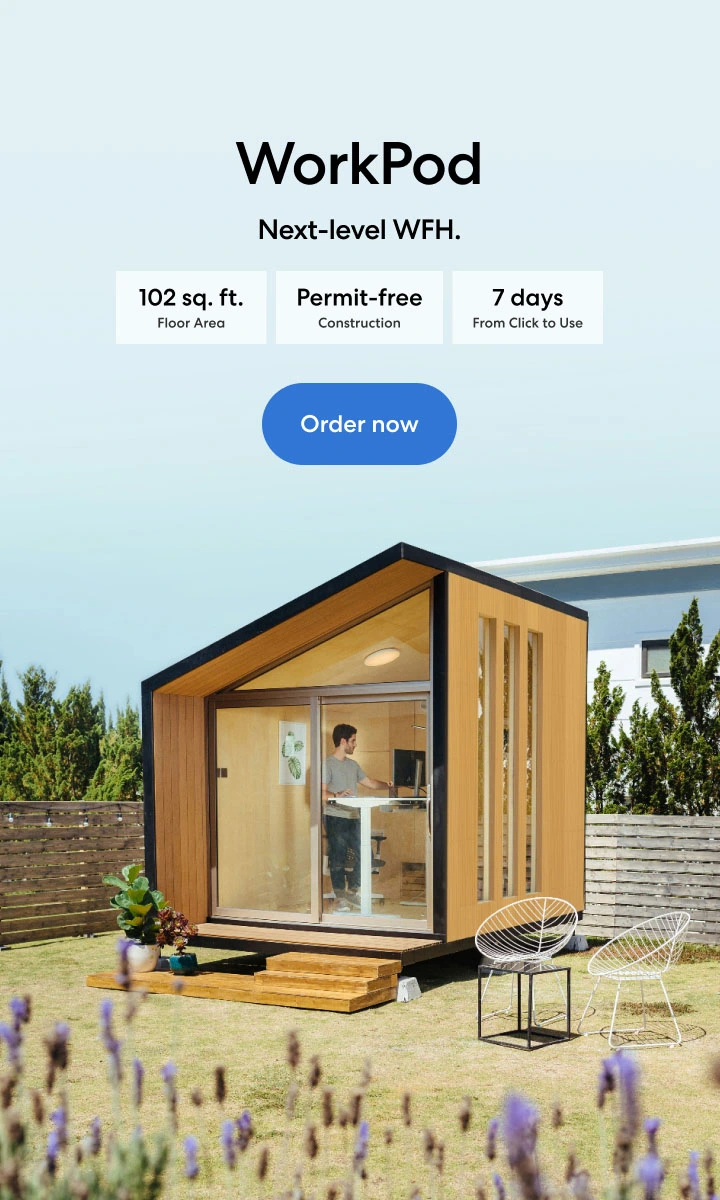
All About ADU - Accessory Dwelling Units Explained
Table of Contents
- ADUs: A Housing Solution Gaining Traction Across the US
- Understanding ADUs
- A Spectrum of ADU Possibilities
- The Pros and Cons
- FAQs
- 1. How many accessory dwelling units can you have?
- 2. Can I build an accessory dwelling unit?
- 3. Are accessory dwelling units legal?
- 4. What is considered an accessory dwelling unit?
- 5. What qualifies as an accessory dwelling unit?
- 6. What is an ADU accessory dwelling unit?
- 7. What constitutes an accessory dwelling unit?
- Conclusion
I will be taking you guys on a fascinating journey of detached accessory dwelling units, backyard accessory dwelling units, outdoor office sheds, and junior accessory dwelling units. These distinct categories represent innovative solutions to the modern challenges of space and living arrangements. From detached units offering privacy and autonomy to backyard office sheds maximizing space efficiency, and outdoor office sheds providing a tranquil workspace, each concept brings unique benefits.
Junior ADUs, tailored for smaller living spaces, cater to diverse needs. Together, they redefine conventional living and workspaces, offering versatility and flexibility in an ever-evolving world. Join me as we explore the endless possibilities of ADU - accessory dwelling units.
ADUs: A Housing Solution Gaining Traction Across the US
Accessory Dwelling Units (ADUs), also known as granny flats or in-law suites, have become a prominent answer to the growing housing challenges in the United States. Particularly in areas like California with skyrocketing housing costs, ADUs offer a practical and versatile solution for homeowners and renters alike. Let's delve deeper into the world of ADUs, exploring their definition, benefits, drawbacks, and diverse forms.
Understanding ADUs
An Accessory Dwelling Unit (ADU) isn't just an extra room - it's a versatile living space with its identity. Here's a concise breakdown:
Size and Functionality: ADUs are compact yet fully functional living spaces, complete with a kitchen, living area/bedroom, and private entrance. They offer autonomy and privacy and serve as comfortable living quarters for occupants.
Purposeful Design: ADUs cater to various needs, from housing aging parents to providing work-from-home spaces or guest accommodations. Their flexibility makes them adaptable to different lifestyles and requirements. For those looking for multifunctional spaces, an ADU can even serve as a detached mother-in-law suite, offering a private retreat for family members or guests.
Affordability Advantage: Compared to traditional home construction, ADUs are cost-effective while meeting safety and building standards. This affordability makes them appealing to homeowners and investors alike.
Passive Income Stream: Many investors turn ADUs into rental units, capitalizing on their lower construction costs and competitive rental rates. This generates additional income while maximizing property value.
For those interested in broader community trends, exploring tiny home communities can provide additional insights into alternative living solutions that emphasize affordability and minimalism.
A Spectrum of ADU Possibilities
Detached ADUs are stand-alone structures offering privacy and versatility, whether newly constructed or converted from existing buildings like sheds or workshops. These can be ideal for creating a private office shed in Dallas or a backyard studio.
Attached ADUs: Integrated with the main house, these units share a wall, creating a seamless living experience with careful attention to soundproofing and privacy.
Interior ADUs: Cleverly tucked within the main house, these units maximize existing space in basements, attics, or converted garages, providing convenience without sacrificing outdoor areas. For smaller homes, exploring room addition ideas for small homes can help maximize the available space efficiently.
ADUs offer more than just extra space - they embody a practical and versatile approach to modern living, whether as a personal sanctuary or a savvy investment opportunity.
The Pros and Cons
While ADUs offer a compelling solution, it's important to consider all aspects before embarking on this project. Here's a breakdown of the key pros and cons:
Pros
- Increased Income Potential: Renting out an ADU creates a steady income stream that can help offset mortgage payments or other expenses.
- Enhanced Property Value: Adding an ADU can significantly boost the overall value of your property, especially in areas with high housing demand.
- Flexible Functionality: From guest quarters to in-law suites, home offices, or even art studios, ADUs offer a wide range of uses to suit your evolving needs.
- Supportive Housing: ADUs provide comfortable and independent living spaces for family members who may need care or assistance. This fosters closer connections while respecting individual needs.
- Community Benefits: By increasing housing options, ADUs contribute to a more diverse and affordable housing market.
Cons
- Space Considerations: Building an ADU may require sacrificing some existing space on your property, such as a storage area or a large portion of your backyard.
- Maintenance Responsibilities: If you plan to rent out your ADU, you'll need to factor in regular maintenance and upkeep costs.
- Permitting and Regulations: Navigating building permits and adhering to local ADU regulations can be a complex process. Be prepared to research thoroughly and potentially involve an architect or contractor familiar with ADU construction in your area. For example, those building an ADU in Hawaii will need to follow specific guidelines for the region.
FAQs
1. How many accessory dwelling units can you have?
The number of ADUs permitted typically depends on local regulations and zoning laws. Some areas may allow multiple ADUs on a single property, while others restrict the number based on factors like lot size and neighborhood density. It's crucial to understand California ADU setback requirements and local zoning laws when planning your project.
2. Can I build an accessory dwelling unit?
In many areas, yes, you can build an ADU, but you must adhere to local building codes, zoning regulations, and permit requirements. Consulting with local authorities and professionals familiar with ADU regulations can help ensure compliance. For instance, knowing the ADU electrical requirements in California can save you from potential complications down the road.
3. Are accessory dwelling units legal?
ADU legality varies by location. Many jurisdictions have adopted policies to encourage ADU construction as a means of addressing housing shortages. However, regulations regarding size, placement, and use may apply. Some areas, like Fremont, have specific guidelines for Fremont ADU construction.
4. What is considered an accessory dwelling unit?
An accessory dwelling unit is a self-contained living space located on the same property as a primary residence. These units can take various forms, including small accessory dwelling units, backyard cottages, or converted structures like garages or sheds. If you're weighing the differences, understanding JADU vs. ADU can help clarify which option best meets your needs.
5. What qualifies as an accessory dwelling unit?
To qualify as an ADU, a structure must meet certain criteria, such as having its entrance, kitchen, bathroom, and living area. It should also comply with local building codes and zoning regulations. Learning about ADU impact fees in California can provide insight into the costs associated with building an ADU in this region.
6. What is an ADU accessory dwelling unit?
An ADU, short for Accessory Dwelling Unit, is a secondary living space on a property, providing independent living facilities. Accessory dwelling unit examples include small ADUs, backyard cottages, or prefab units like studio sheds or office pods.
7. What constitutes an accessory dwelling unit?
An accessory dwelling unit constitutes a self-contained living space with essential amenities, typically smaller than the main house. Examples include small ADUs, backyard cottages, or office pods designed for various uses, such as additional living space, rental units, or workspaces.
Conclusion
While ADUs offer a versatile housing solution, their feasibility and legality depend on local regulations and compliance with building codes. Exploring options like small ADUs, prefab ADUs, or backyard office pods can provide insight into the diverse possibilities ADUs offer. Buy an accessory dwelling unit and see how it changes your life.
ADUs represent a modern and flexible solution to housing challenges, offering endless possibilities for homeowners and investors alike. Whether you’re considering a meditation shed, an office space, or additional housing, the versatility of ADUs makes them a valuable addition to any property.
Stay connected with us!
Subscribe to our weekly updates to stay in the loop about our latest innovations and community news!
Interested in a Link Placement?
Spread the word
.svg)
.svg)



/https://storage.googleapis.com/s3-autonomous-upgrade-3/production/ecm/230914/bulk-order-sep-2023-720x1200-CTA-min.jpg)

/https://storage.googleapis.com/s3-autonomous-upgrade-3/production/ecm/230824/image_tMoN47-V_1692155358869_raw-93ed49d8-7424-464e-bdfe-20ab3586d993.jpg)